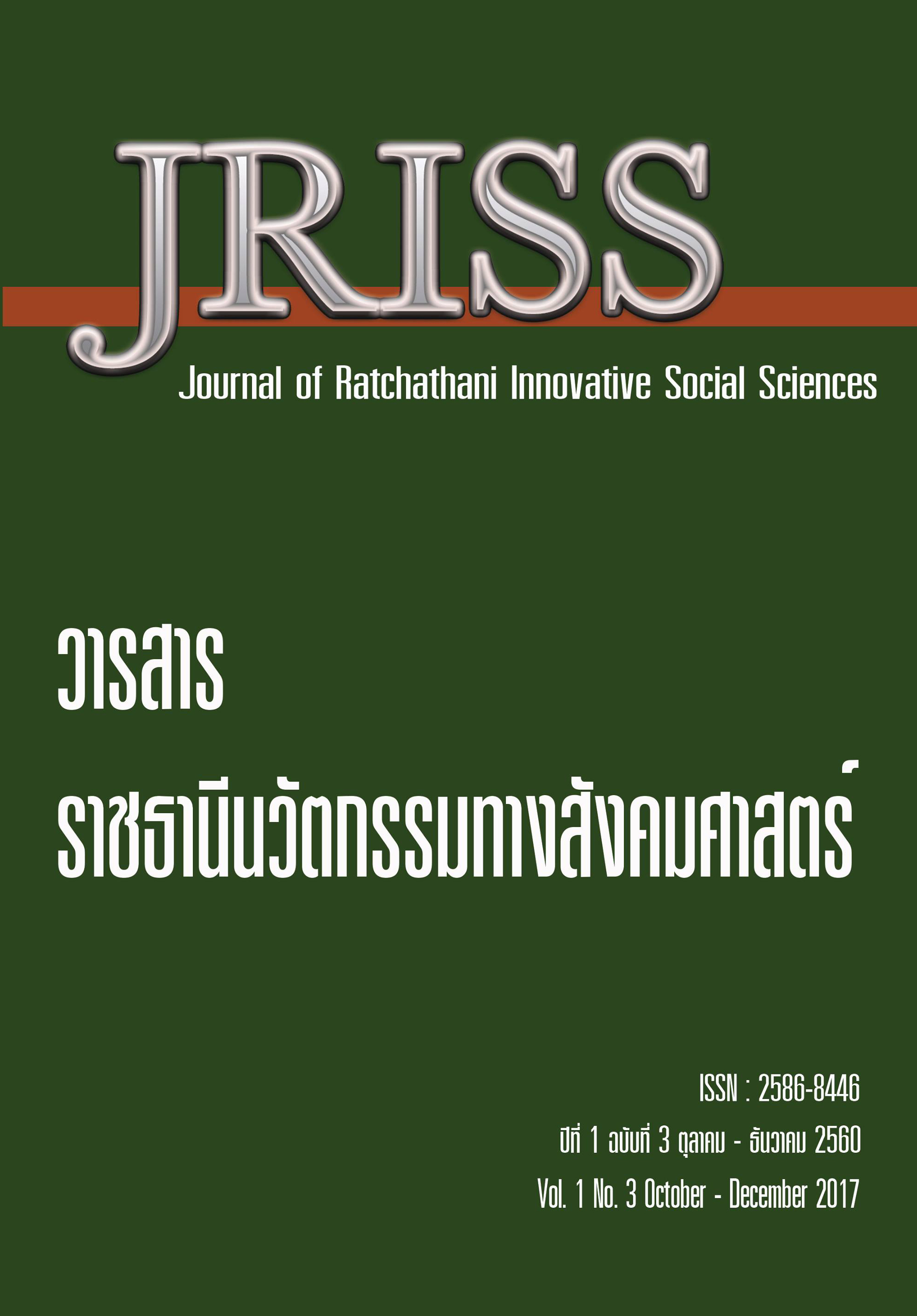Teachers’ Opinions towards Power Exercises of School Administrators under the Jurisdiction of the Secondary Educational Service Area Office 29.
Main Article Content
Abstract
This research aimed to 1) study teachers’ opinions towards power exercises of school administrators under the jurisdiction of the Secondary Educational Service Area Office 29, 2) compare the teachers’ opinions towards power exercises of school administrators under the jurisdiction of the Secondary Educational Service Area Office 29, and 3) study guidelines for developing power exercises of school administrators under the jurisdiction of the Secondary Educational Service Area Office 29.This research was conducted in two stages: The first stage was to study the teachers’ opinions towards the power exercises of school administrators under the jurisdiction of the Secondary Educational Service Area Office 29. The sample consisted of 302 people; the research tool was a questionnaire with discrimination index between 0.07-0.66, and the reliability was 0.88. The data were analyzed by frequencies, means, percentage, average and standard deviation. The comparison of the opinions towards the power exercises of the school administrators classified by status, genders, by using t-test Independent, and classified by teaching experiences by using F-test: One Way ANOVA. The second stage was to study the guidelines for developing the power exercises of the school administrators under the jurisdiction of the Secondary Educational Service Area Office 29 by interviewing.The sample consisted of 20 peoples, selected by purposive sampling. The tool for gathering data was the interview guideline with its index of item objective congruence at 1.00 in all items. The data was analyzed by content analysis and summarized by narrative.
The results of the research were as follows:
- 1. The teachers’ opinions towards the power exercises of school administrators under the jurisdiction of the Secondary Educational Service Area Office 29, as a whole, it were at high level. When considered each aspect, it revealed to be high level in all 5 aspects; 1) Expert, 2) Legitimate, 3) Coercive, 4) Reference, and 5) Information
- 2. The results of comparison of the opinions towards the power exercises of school administrators under the jurisdiction of the Secondary Educational Service Area Office 29, classified by genders, we found that the overall was different at the statistically significant 0.05 level, when consider each aspect, there were different in all aspects at the statistically significant at 0.05 level which consisted of; 1) Expert, 2) Legitimate, 3) Coercive, 4) Reference, and 5) Information. When classified by teaching experiences, we found that it was not different at the statistically significant 0.05 level.
- 3. The results of the guidelines for developing the power exercises of the school administrators under the jurisdiction of the Secondary Educational Service Area Office 29 revealed as follows: 1) Expert Power, the administrator should develop in the area of curriculum development, research for educational quality development, personnel planning, knowledge and guideline on organizational control, and budget planning and proposal, budget allocation, financial management, accountant and resource management. 2) Legitimate power, the administrator should develop in the areas of regulations related to supervision and control teachers’ performance, disciplines and, regulation on salary and promotion. 3) Coercive Power, the administrator should develop on command power, punishment, both on teaching, working on time, and behaviors. 4) Reference Power, the administrator should develop in the areas of cooperation of academic development and co-working with other organizations to promote efficient performance. 5) Information Power, the administrator should develop in the areas of educational medias, innovation and technology, educational supervision, counseling, promoting community knowledge, systems and information networking development, cooperation and educational network development, information technology, and public relations on education.
Article Details
ความคิดเห็นและข้อเสนอแนะใด ๆ ที่นำเสนอในบทความเป็นของผู้เขียนแต่เพียงผู้เดียวโดยบรรณาธิการ กองบรรณาธิการ และคณะกรรมการวารสารราชธานีนวัตกรรมทางสังคมศาสตร์ไม่ได้มีส่วนเกี่ยวข้องแต่อย่างใด มหาวิทยาลัย บรรณาธิการ และกองบรรณาธิการจะไม่รับผิดชอบต่อข้อผิดพลาดหรือผลที่เกิด จากการใช้ข้อมูลที่ปรากฏในวารสารฉบับนี้
References
ขวัญใจ ประภาสัย. (2557). พฤติกรรมการใช้อำนาจของผู้บริหารโรงเรียน ตามความคิดเห็นของครู อำเภอเขาฉกรรจ์ สังกัดสำนักงานเขตพื้นทีการศึกษาประถมศึกษาสระแก้ว เขต 1.
วิทยานิพนธ์การศึกษามหาบัณฑิต สาขาวิชาการบริหารการศึกษา: มหาวิทยาลัยบูรพา.
ญาณวีร์ ค้าแผลง. (2555). การใช้อำนาจของผู้บริหารสถานศึกษา สหวิทยาเขตเมืองชลบุรี 3 สังกัดสำนักงานเขตพื้นที่การศึกษาประถมศึกษาชลบุรี เขต 1.วิทยานิพนธ์ศึกษามหาบัณฑิต สาขาวิชาการบริหารการศึกษา: มหาวิทยาลัยบูรพา.
ดัชนี คงทันดี. (2558). การใช้อำนาจของผู้บริหารในทัศนะของครูโรงเรียนมัธยมศึกษาสังกัดองค์การบริหารส่วนจังหวัดสระแก้ว. วิทยานิพนธ์ศึกษามหาบัณฑิต สาขาวิชาการบริหารการศึกษา: มหาวิทยาลัยบูรพา.
ธีระ รุญเจริญ. (2546). การบริหารโรงเรียนยุคปฏิรูปการศึกษา. กรุงเทพฯ: ข้าวฟ่าง.
พิกุล ดีพิจารณ์ (2548). การใช้อำนาจของผู้บริหารกับความพึงพอใจในการปฏิบัติงานของครูโรงเรียน เอกชน ในเขตภาคตะวันออก.วิทยานิพนธ์ศึกษามหาบัณฑิต สาขาวิชาการบริหารการศึกษา: มหาวิทยาลัยบูรพา.
วราภรณ์ พรหมรัตน. (2554). การใช้อำนาจของผู้บริหารกับความพึงพอใจในการปฏิบัติงานของครู โรงเรียนมัธยมศึกษาสังกัดสำนักงานเขตพื้นที่การศึกษาชลบุรี เขต 3. วิทยานิพนธ์ศึกษามหาบัณฑิต สาขาวิชาการบริหารการศึกษา: มหาวิทยาลัยบูรพา.
วิไล ล่าสิงห์. (2550). การใช้อำนาจของผู้บริหารกับแรงจูงใจในการปฏิบัติงานของครูปฏิบัติการสอน โรงเรียนมัธยมศึกษา สังกัดสำนักงานเขตพื้นที่การศึกษาตราด.วิทยานิพนธ์ศึกษามหาบัณฑิต สาขาวิชาการบริหารการศึกษา: มหาวิทยาลัยบูรพา.
ไวภพ สุขกระโทก. (2556). ). การใช้อำนาจของผู้บริหารสถานศึกษา สังกัดสำนักงานเขตพื้นที่การศึกษาประถมศึกษาฉะเชิงเทรา เขต 2. วิทยานิพนธ์การศึกษามหาบัณฑิต สาขาวิชาการบริหารการศึกษา: มหาวิทยาลัยบูรพา.
สายัณร์ รอดจันทึก. (2556). การใช้อำนาจของผู้บริหารโรงเรียน สังกัดสำนักงานเขตพื้นที่การศึกษาประถมศึกษาบุรีรัมย์ เขต 4. วิทยานิพนธ์การศึกษามหาบัณฑิต สาขาวิชาการบริหารการศึกษา: มหาวิทยาลัยราชภัฎบุรีรัมย์.
สำนักงานเขตพื้นที่การศึกษามัธยมศึกษา เขต 29. (2559). แผนพัฒนาคุณภาพการศึกษาสำนักงานเขตพื้นที่การศึกษามัธยมศึกษา เขต 29. อุบลราชธานี : สำนักงานเขตพื้นที่การศึกษามัธยมศึกษา เขต 29.
สุรีวัลย์ ดาราพงษ์. (2557). การใช้อำนาจของผู้บริหารสถานศึกษา สังกัดสำนักงานเขตพื้นที่การศึกษาประถมศึกษาตราด. วิทยานิพนธ์ศึกษามหาบัณฑิต สาขาวิชาการบริหารการศึกษา: มหาวิทยาลัย บูรพา.
อมรารัตน์ กิจธิคุณ (2555). การใช้พลังอำนาจของผู้บริหารที่สัมพันธ์กับแรงจูงใจของครูโรงเรียนโสตศึกษาสำนักงานคณะกรรมการการศึกษาขั้นพื้นฐาน.วิทยานิพนธ์ศึกษามหาบัณฑิต สาขาวิชาการบริหารการศึกษา: มหาวิทยาลัยราชภัฏนครศรีธรรมราช.
อาคม วัดไธสง. (2547). หน้าที่ผู้นำในการบริหารการศึกษา. พิมพ์ครั้งที่ 2 สงขลา: ภารกิจเอกสารและตำรามหาวิทยาลัยทักษิณ
อัสมาดี เจะอาแซ ดิลก. (2558). การใช้อำนาจของผู้บริหารสถานศึกษา ศูนย์เครือข่ายยะรัง อำเภอยะรัง สำนักงานเขตพื้นที่การศึกษาประถมศึกษาปัตตานี เขต 2. วิทยานิพนธ์การศึกษามหาบัณฑิต สาขาวิชาการบริหารการศึกษา: มหาวิทยาลัยสงขลานครินทร์ วิทยาเขตปัตตานี.


